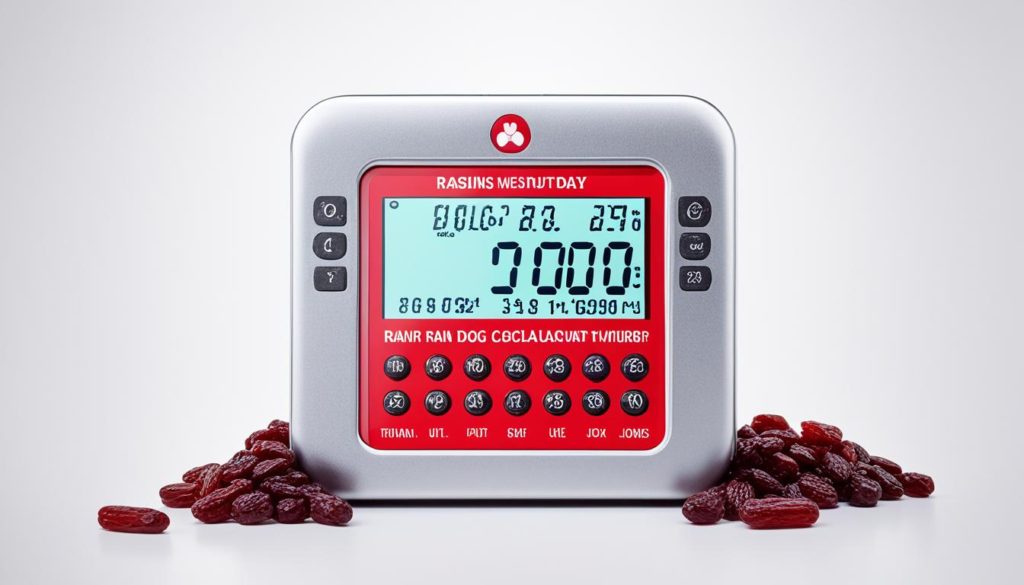Are you worried that your dog may have ingested raisins? Knowing the potential risk and taking immediate action is crucial for your furry friend’s well-being.
That’s where the Dog Raisin Toxicity Calculator comes in handy.
By simply entering your dog’s weight and the size of the raisin, the calculator will estimate the toxic and serious toxicity doses of raisins.
This information can help you assess the severity of the situation and take appropriate action, such as contacting a veterinarian.
It’s important to remember that raisins and grapes are toxic to dogs and can lead to acute kidney injury and kidney failure. The exact causes of raisin toxicity are still unknown, but potential factors include mycotoxins, salicylate, and tartaric acid. Prompt action and professional guidance are crucial in cases of raisin ingestion.
use the Dog Raisin Toxicity Calculator to find out if your dog is at risk!
Key Takeaways:
- The Dog Raisin Toxicity Calculator allows you to quickly assess the potential risk of raisin ingestion for your dog.
- Raisins and grapes are toxic to dogs and can cause acute kidney injury and kidney failure.
- The calculator estimates the toxic and serious toxicity doses of raisins based on your dog’s weight and the size of the raisin.
- If you suspect your dog has ingested raisins, contact a veterinarian immediately for prompt action and professional guidance.
- Prevention is key – keep grapes, raisins, and any foods containing them out of reach from your dog to minimize the risk of raisin toxicity.
Understanding Raisin Toxicity in Dogs
Raisin toxicity in dogs is a serious concern, as it can lead to acute kidney injury and kidney failure. It is important to have a thorough understanding of the potential risks associated with raisin ingestion and take appropriate action to protect your dog’s health. While the exact reason behind raisin toxicity in dogs remains unclear, several potential causes have been identified, including mycotoxins, salicylate, and tartaric acid.
The toxicity level of raisins for dogs can vary, and individual sensitivity also plays a role in determining the severity of the reaction. To accurately assess the risk of raisin ingestion for your dog, you can utilize the dog raisin toxicity calculator. By inputting your dog’s weight and the size of the raisin, the calculator provides valuable information on the potential toxicity levels. This risk assessment allows you to gauge the seriousness of the situation and take appropriate measures.
Remember, raisin poisoning in dogs can have severe consequences, so it is crucial to be proactive and take preventive measures to keep your dog safe.
If you suspect that your dog has ingested raisins or are unsure about the potential risk, it is always best to consult with a veterinarian. They can provide expert guidance and advice based on your dog’s specific situation and help ensure their well-being.
The Importance of Calculating Raisin Toxicity in Dogs:
Calculating raisin toxicity in dogs is imperative, as it helps in assessing the potential risks associated with raisin ingestion. By understanding the level of toxicity, dog owners can take prompt action and seek appropriate veterinary care when necessary. This risk assessment also aids in determining the seriousness of the situation, allowing for timely intervention.
| Benefits of Calculating Raisin Toxicity in Dogs: |
|---|
| – Provides crucial information on potential toxicity levels |
| – Helps in determining the seriousness of the situation |
| – Guides dog owners in taking appropriate action |
| – Enables prompt veterinary intervention |
By utilizing the dog raisin toxicity calculator and calculating raisin toxicity in dogs, you can ensure the safety and well-being of your furry companion. Remember, prevention is key when it comes to raisin poisoning. Keep raisins and grapes out of your dog’s reach, and educate yourself about the potential hazards to protect your beloved pet.
Symptoms of Raisin Toxicity in Dogs
Dogs that have ingested raisins may exhibit various symptoms, which can range from mild to severe. It is important to recognize these symptoms and seek immediate veterinary attention to ensure your dog’s well-being.
- Loss of appetite: Dogs that have ingested raisins may experience a sudden decrease in their appetite.
- Lethargy: Raisin toxicity can cause a dog to become lethargic and lack energy.
- Vomiting and diarrhea: Dogs may vomit and have diarrhea as a result of raisin ingestion.
- Stomach pain: Abdominal discomfort can be a symptom of raisin toxicity in dogs.
- Dehydration: Raisins can cause dehydration in dogs, leading to increased thirst and urine production.
- Kidney damage: Raisin ingestion can cause kidney damage, resulting in decreased kidney function and potential kidney failure.
- High blood pressure: Dogs with raisin toxicity may experience an increase in blood pressure.
These symptoms can occur within hours to days after ingestion. If you suspect that your dog has ingested raisins and is exhibiting any of these symptoms, it is crucial to contact a veterinarian immediately for guidance and treatment.

Treatment and Prevention of Raisin Toxicity
If your dog has ingested raisins and is showing signs of toxicity, prompt treatment is crucial for their well-being. Treatment may include inducing vomiting, administering activated charcoal or laxatives, intravenous fluid therapy, monitoring kidney function, supportive medications, and blood tests. The prognosis will depend on various factors, including the amount ingested, the timing of treatment, and the dog’s response to treatment. Prevention is always better than treatment, and it is important to keep grapes, raisins, and any foods containing them out of reach from dogs. Educate family members and guests about the dangers of raisin toxicity, check the ingredients of food products, and properly dispose of any grape or raisin products. By taking preventive measures, you can significantly reduce the risk of raisin toxicity in dogs and ensure their safety.

Treatment Options for Raisin Toxicity in Dogs
In cases of raisin toxicity, prompt veterinary treatment is essential. The specific treatment options may vary depending on the severity of the toxicity and the individual dog’s condition. Here are some common treatment approaches:
- Inducing vomiting: If the ingestion of raisins occurred within the past hour, a veterinarian may induce vomiting to remove the raisins from the dog’s stomach.
- Administering activated charcoal or laxatives: These can aid in absorbing and eliminating any residual toxins from the dog’s digestive system.
- Intravenous fluid therapy: Dogs with raisin toxicity often require intravenous fluids to prevent dehydration and support kidney function.
- Monitoring kidney function: Regular blood tests may be performed to assess the dog’s kidney function and determine the effectiveness of the treatment.
- Supportive medications: Additional medications may be prescribed to manage symptoms, alleviate discomfort, and support the dog’s overall well-being.
Preventing Raisin Toxicity in Dogs
Prevention is the key to avoiding raisin toxicity in dogs. By taking proactive measures, you can minimize the risk of accidental ingestion. Here are some tips to prevent raisin toxicity:
- Keep grapes and raisins out of reach: Ensure that grapes and raisins are stored securely in closed containers or cabinets that are inaccessible to your dog.
- Check ingredient lists: Before offering any food products to your dog, carefully read the ingredient list to ensure they do not contain grapes or raisins.
- Dispose of grape and raisin products: Properly dispose of any leftover grapes, raisins, or foods containing them to prevent accidental ingestion.
- Educate family members and guests: Make sure everyone in your household and any visitors are aware of the dangers of raisin toxicity and the importance of keeping grapes and raisins away from dogs.
By following these preventive measures and staying vigilant, you can create a safe environment for your dog and reduce the risk of raisin toxicity.
| Treatment Options | Preventive Measures |
|---|---|
| Inducing vomiting | Keep grapes and raisins out of reach |
| Administering activated charcoal or laxatives | Check ingredient lists |
| Intravenous fluid therapy | Dispose of grape and raisin products |
| Monitoring kidney function | Educate family members and guests |
| Supportive medications |
Conclusion
Raisin toxicity in dogs can be a serious concern for their safety and well-being. However, dog owners can now assess the potential risk quickly and accurately with the help of the dog raisin toxicity calculator. This valuable tool estimates the toxic and serious toxicity doses of raisins based on your dog’s weight, providing crucial information for risk assessment.
It’s important to note that the exact reason for raisin toxicity in dogs is still unknown. Therefore, any consumption of raisins should be treated as a cause for concern. When faced with such a situation, prompt action and professional guidance are essential. Contact a veterinarian immediately if you suspect your dog has ingested raisins.
Prevention plays a vital role in ensuring your dog’s safety. By staying informed about the dangers of raisin toxicity, taking advantage of the dog raisin toxicity calculator, and implementing preventive measures, you can minimize the risk to your furry friend. Keep grapes and raisins out of your dog’s reach, educate your family members and guests, and carefully check the ingredients of food products to prevent any accidental ingestion.
Protecting your dog’s safety and well-being is of utmost importance. Stay informed, assess the risk with the dog raisin toxicity calculator, and take proactive steps to keep grapes and raisins away from your four-legged companion. By doing so, you can ensure a happy and healthy life for your beloved dog.
FAQ
What is the dog raisin toxicity calculator?
The dog raisin toxicity calculator is a tool that allows dog owners to assess the potential risk of raisin ingestion for their dogs. By entering the dog’s weight and the size of the raisin, the calculator estimates the toxic and serious toxicity doses of raisins.
Why are raisins toxic to dogs?
The exact reason for raisin toxicity in dogs is still unclear, but potential causes include mycotoxins, salicylate, and tartaric acid.
What are the symptoms of raisin toxicity in dogs?
Symptoms of raisin toxicity in dogs can include loss of appetite, lethargy, vomiting, diarrhea, stomach pain, dehydration, increased thirst and urine production, kidney damage, and high blood pressure.
What should I do if I suspect my dog has ingested raisins?
If you suspect your dog has ingested raisins, it is important to contact a veterinarian immediately for guidance and treatment.
How is raisin toxicity in dogs treated?
Treatment for raisin toxicity in dogs may include inducing vomiting, administering activated charcoal or laxatives, intravenous fluid therapy, monitoring kidney function, supportive medications, and blood tests.
What is the prognosis for dogs with raisin toxicity?
The prognosis for dogs with raisin toxicity depends on factors such as the amount ingested, the timing of treatment, and the dog’s response to treatment.
How can I prevent raisin toxicity in dogs?
To prevent raisin toxicity in dogs, it is important to keep grapes, raisins, and any foods containing them out of reach from dogs. Educate family members and guests about the dangers of raisin toxicity, check the ingredients of food products, and properly dispose of any grape or raisin products.

